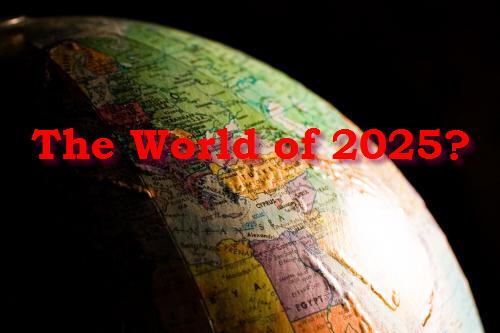Some of you who read my blog postings find them on The Futurist, the site of the World Future Society. I thought I would share with you today what the collective wisdom of the members of the Society are prognosticating as likely to happen in a little more than the next decade of the 21st century. These are forecasts with which this author may or may not agree. I follow each prediction with my thoughts appearing in italics.
- Electric cars will pay for themselves as owners when parked will feed energy to the power companies. This will mean much better batteries or the development of fuel cell technology and a hydrogen infrastructure. We are still far away from that but there are a number of companies chomping at the bit to make this happen.
- Robot blueprints will be open-source and the cost of making robots will drop by 90%. When I first started working with computers there were Heath Kits that allowed you to build and assemble your own personal computer. Now think of an adult version of LEGO Mindstorms combined with 3D printers and you get an idea of what will be possible in the age of robotics.
- Cellphones will change Africa. Not hard to believe in this one considering yesterday’s blog posting about malaria studies in Kenya using mobile phones. But in this case the phones will also change governance.
- The oceans will face devastating mass extinctions by 2050. This dire prediction is based on existing trends of overfishing, ocean acidification from CO2 and our continued use of the ocean as a waste dump. The Society projects a global extinction equal to those that happened in the natural world over the last 600 million years.
- The intelligent cloud will arrive. I absolutely believe that the Internet will become the central source of knowledge and will contain agents that will be personally sensitive to you, recognizing all of your tastes and preferences.
- The age of 3D manufacturing will arrive. As 3D printers become cheaper and more versatile mass customization will replace traditional mass manufacturing. We may all be manufacturers in the near future with the ability to download the specifications for any object or device we need.
- India will become number one in population by 2028 and may surpass China in technological advances. This forecast is based on trending on patents filed by scientists and entrepreneurs in India in the last few years. But India will have to overcome the lack of inertia that has been part of its culture since independence.
- The future of new housing is green. This is based on trending data that shows more builders in North America are adding green features to individual homes as well as multi-residence buildings based on data from the National Association of Home Builders.
- Robot caregivers will become a common sight. Japan is leading the way on this with an aging and shrinking population leaving fewer young caregivers available to deal with a growing number of elderly. It seems counter intuitive to develop robots to do care when so many young people under age 30 are under or unemployed today. But it appears that seniors seem to be more accepting of a robot’s help than a human’s.
- Nanotechnology will get cheaper and allow us to create a new generation of smart materials that we will use for countless applications including building, transportation, clothing, medicine, space and power generation. We are already seeing strong evidence of this with the development of carbon fibers replacing traditional materials like steel and aluminum in airframe construction. But what the Society projects, something with which I concur, is that materials will not only be used to build objects but also generate energy for them.
- The Internet of Things will connect us and everything else into a giant mesh network. This means trillions of devices will be interconnected each with its own unique IP address. Talk about an age of collective intelligence.
- Corporations will be run by people expert in understanding ubiquitous communication through the Internet and the social networks on it. The Society projects and I concur, that experts in meta data and content will rule the executive suite.
- Breathalyzers will diagnose disease in seconds. We are seeing the entry into the market of all kinds of personal health devices that will help us determine our state of wellness and alert us to potential risks from disease or exposure to poll.
- Lab-on-a-chip technology will change the way we monitor human health. This has truly revolutionary implications for the people of Developing World countries who will be able to skip the building of elaborate diagnostic health infrastructures with all the expensive equipment we use today here in the Developed World.
- We will have medical nanobots coursing through our bodies attacking individual cancer cells and delivering packets of DNA to reverse diseases and conditions brought about by defective genes. Medical science is trending toward specifically designed treatments for individuals whether fighting cancer or dealing with acquired or genetic diseases.
- We will have the ability to live much longer with many more centenarians than ever before. The challenge here will be accessibility to the medical treatments and technologies that will allow us to reach a hundred years of age. Today we live in a world of the haves and have nots in health care. Will living to more than one hundred be limited to those with the means to afford it or will there be universal access to the technology to make this possible for all?
- Augmented reality will alter our relationship with those we buy from and impact the success or lack thereof of businesses. From Google Glass to smartphones we will interact with the world around us with more than our natural senses. How businesses respond to this technology capability will determine their ultimate success in the marketplace.
- Forget peak oil. The real problem will not be a lack of fossil fuels it will be a lack of freshwater. We are already witnessing water crises in many places around the world. Cities like Las Vegas may have a short shelf life if climate change leads to further droughts in the U.S. Southwest. The same will be true for cities in Florida with rising ocean levels impacting freshwater aquifers.
- The fastest growing religious group in the United States today is the Amish. Their population will reach 1 million by 2050. I’m not quite sure why this is in the Society’s list of 20 top future trends but there may be an analogy here. For example, the fastest growing community within Israel today is the Haredi, ultra-orthodox who have very large families. Does this portend that small ultra-religious sects will reproductively outproduce the rest of us over the long term?
- The next Space Age will begin in the 2020s. This new period in space will be dominated by private ventures and not government programs. The evidence is very much pointed in this direction with Virgin Galactic about to launch suborbital rides into space for the rich with the price coming down over time. This will lead to suborbital transcontinental passenger service. Meanwhile companies like SpaceX and others will be developing reusable rocket and spaceplane technology for getting to and from low-Earth orbit. For space faring national programs low-Earth orbit will no longer be the focus. Instead we will see programs seeking a mix of human and robotic space presence on or near the Moon including the first Deep Space habitations. Will we get to Mars as Mars One envisions by 2024? I wouldn’t bet on it. Too many things can go wrong with that project. With the development of propulsion systems that move us faster and expose us less to perils of interplanetary space, however, we will diminish the risks associated with such a venture.
So that’s 20 projections the World Future Society has come up with between now and 2025. Do you agree with all of them? Do you have your own projections for what humanity will be able to accomplish or not by 2025? One thing I noticed is very little in the way of projections about energy. Don’t you find that unusual considering how much today we are focused on the exploitation of new sources of fossil fuels through fracking and deep sea drilling? And nothing to speak of on climate change forecasts. And what about warfare? All these are missing from the mix.
I’d love to hear from you with your 20 projections for the world in 2025.











[…] is so special about 2025? Well, I’m not sure yet, but let’s look take a […]
I don’t believe any individual or group of individuals can’t predict with any certainty what will happen in 2025. There are so many possibilities whether they involves medicine, energy, space travel, economics, housing, transportation, education, and employment opportunities.
I think futurists speculate based on experience and doing trend analysis starting with the recent past and then projecting into the future.